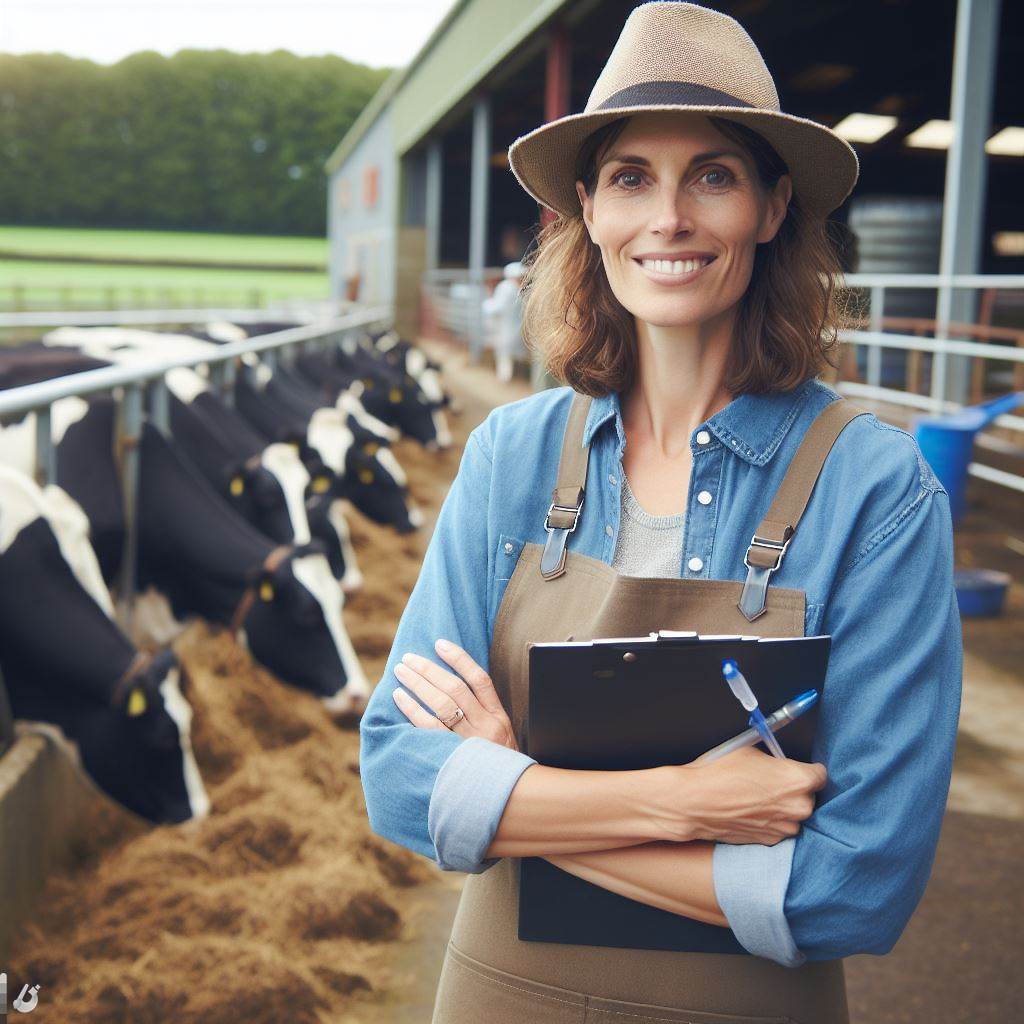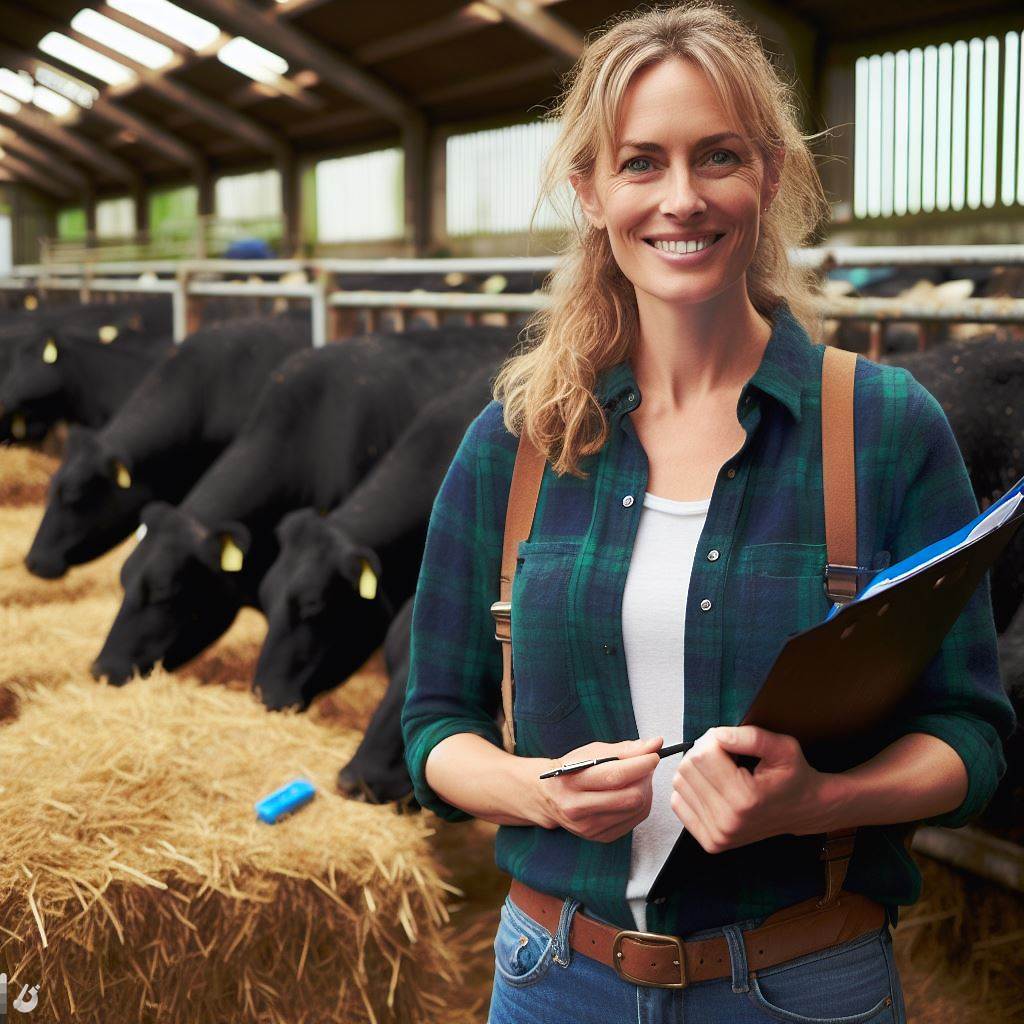Introduction
Urban farming, the practice of growing food in urban areas, is becoming increasingly popular in the UK. With the rise of sustainable living and the need for locally sourced produce, urban farming is gaining traction.
But could this trend also extend to becoming a new career path for agri-managers in the country
Urban farming has emerged as a viable solution to address food shortages in urban areas.
The concept involves growing fruits, vegetables, and herbs in limited spaces such as rooftops, balconies, and vertical gardens.
The popularity of urban farming has been fueled by the desire for fresh, organic produce and the awareness of the environmental impacts of traditional agriculture.
Many individuals and communities have started to embrace urban farming, leading to the creation of small-scale urban farms across the UK.
These farms not only provide fresh produce but also contribute to the local economy, enhance food security, and promote sustainable living.
But could urban farming become a feasible career choice for agri-managers? That is the question many are now asking.
Agri-managers, traditionally focused on rural farming, may need to adapt their skills and knowledge to this urban-focused approach.
Urban farming requires novel techniques and a deep understanding of urban dynamics and resource management.
Agri-managers could play a crucial role in overseeing and implementing urban farming projects, ensuring their success and profitability.
By embracing urban farming, agri-managers could tap into a new market, diversify their skills, and contribute to the overall sustainability of the country’s food system.
In essence, urban farming is gaining popularity in the UK, presenting a unique opportunity for agri-managers to expand their expertise and contribute to sustainable food production in urban areas.
What is urban farming?
Urban farming is the practice of growing and cultivating food in urban areas.
The concept of urban farming
It is a concept that aims to bring agriculture closer to people, allowing them to grow their food sustainably and locally.
The different types of urban farming such as rooftop gardens, vertical farming, and community gardens
There are various types of urban farming, each with its unique characteristics and benefits.
Personalized UK Career Consulting
Receive tailored career guidance designed just for you. Get actionable steps and expert support to boost your career in 1-3 days. Take control of your career now.
Get StartedRooftop gardens, for example, involve the use of rooftops as spaces for growing vegetables, fruits, and herbs.
These gardens utilize unused or underutilized urban spaces, making them valuable resources for food production.
Vertical farming is another type of urban farming that involves the cultivation of crops in vertically stacked layers.
By using controlled environments, such as hydroponics or aeroponics, vertical farms can maximize space and yield more crops.
Community gardens are also an integral part of urban farming, where individuals or groups cultivate gardens in shared spaces.
These gardens foster community engagement and provide access to fresh produce for residents in urban areas.
The advantages of urban farming, such as reduced transportation costs and increased access to fresh produce
Urban farming offers numerous advantages that make it an appealing alternative to conventional agriculture.
Firstly, it significantly reduces transportation costs and energy consumption associated with food distribution.
By growing food in urban areas, farmers can directly supply local markets, reducing the need for long-distance transportation.
This not only decreases carbon emissions but also supports local economies and reduces dependence on national food supply chains.
Additionally, urban farming improves access to fresh and healthy produce, especially in food deserts, where there is a lack of grocery stores or markets.
People living in urban areas often have limited access to fresh fruits and vegetables, leading to poor diets and health issues.
By establishing urban farms and community gardens, fresh produce becomes more accessible and affordable.
Moreover, urban farming promotes sustainability by utilizing organic farming methods and minimizing the use of synthetic pesticides and fertilizers.
Your Dream Job Starts with a Perfect CV
Get a tailored CV and cover letter that captures your unique strengths and stands out in your industry. Let us help you make an unforgettable first impression.
Get StartedIt encourages the practice of composting and recycling, reducing waste and promoting circular economies in cities.
Urban farms also serve as green spaces that contribute to mitigating the effects of climate change.
They absorb CO2, reduce urban heat islands, and promote biodiversity in cities.
Furthermore, urban farming fosters education and awareness about food production and nutrition.
It provides opportunities for people to learn about sustainable farming practices, healthy eating habits, and the importance of local food systems.
Basically, urban farming is a growing movement that brings agriculture closer to urban dwellers.
By utilizing various forms of urban agriculture, such as rooftop gardens, vertical farming, and community gardens, the benefits of this practice are manifold.
From reducing transportation costs to improving access to fresh produce and promoting sustainability, urban farming holds significant potential for shaping the future of food production in urban areas.
The Rise of Urban Farming in the UK
Urban farming is on the rise in the UK, with an increasing number of people turning to this innovative agricultural practice in cities across the country.
Growth of Urban Farming in the UK
Statistics show that the number of urban farms in the UK has been steadily increasing over the past decade.
According to the Office for National Statistics, there has been a 68% growth in urban farming initiatives between 2010 and 2020.
This growth can be attributed to the increasing popularity of urban farming among individuals and communities in both rural and urban areas.
As people become more aware of the environmental impacts of conventional farming practices, they are turning to urban farming as a sustainable alternative.
Reasons for the Increasing Popularity
One of the main reasons behind the growing popularity of urban farming is the rising concern for the environment.
Urban farms utilize unused spaces in cities, such as rooftops, vacant lots, and even vertical gardens, reducing the need for land and preventing urban sprawl.
In addition, urban farming promotes local food production, which has become a significant concern for many consumers.
Urban farming meets the demand for fresh, organic produce, bringing food production closer, cutting transportation costs, and guaranteeing local availability.
The COVID-19 pandemic has also played a role in the surge of urban farming.
As lockdowns and disruptions to global supply chains occurred, many people started growing their own food at home, leading to a renewed interest in urban farming and self-sustainability.
Optimize Your LinkedIn for Success
Boost your LinkedIn profile with a professional bio, keyword-rich headline, and strategic recommendations that attract recruiters. Stand out from the crowd and get noticed.
Optimize NowSuccessful Urban Farming Initiatives in the UK
Across the UK, there are numerous successful urban farming initiatives that have gained recognition for their innovative approach and positive impact on local communities.
One notable example is the Growing Communities project in Hackney, London.
This initiative operates a successful community-led urban farm, supplying locally grown organic produce to the surrounding area.
Their model of community-supported agriculture has inspired similar projects across the country.
Another noteworthy urban farming initiative is the Skyfarm in Manchester. This vertical farm uses advanced hydroponic systems to grow a variety of crops, including leafy greens and herbs.
The Skyfarm produces a high volume of fresh produce, minimizing the environmental footprint associated with traditional farming methods.
The Urban Veg project in Birmingham converts public spaces into vibrant urban farms, engaging locals in food production and sustainable farming.
The project has successfully created a sense of community and improved access to fresh produce in the area.
As urban farming continues to gain momentum in the UK, more people are recognizing its potential as a sustainable and community-building practice.
With the growth in urban farming initiatives and the positive impact they have on the environment and local food production, it is clear that urban farming is here to stay.
Read: Aquaculture in the UK: Education Pathways
Urban Farming: The New UK Agri-Managers?
Urban farming has the potential to emerge as a viable profession in the UK, providing unique opportunities for agri-managers who possess the necessary skills and knowledge.
The Skills and Knowledge Required to be an Agri-Manager in Urban Farming
- Strong understanding of agriculture, horticulture, and sustainable farming techniques
- Knowledge of urban planning and land use regulations
- Ability to design and implement efficient farming systems in limited urban spaces
- Expertise in hydroponics, vertical farming, and other innovative farming methods
- Understanding of marketing and distribution strategies for urban farm products
- Excellent problem-solving and decision-making skills
- Good communication and leadership abilities to manage farm workers and engage with the community
- Awareness of environmental challenges and ability to implement sustainable practices
Agri-managers in urban farming need to be versatile individuals who can handle multiple responsibilities in a dynamic environment.
Potential Career Opportunities in Urban Farming
The emergence of urban farming has created a range of career prospects for individuals interested in sustainable food production and community development.
- Farm Managers: They oversee day-to-day operations, manage resources, and ensure optimal yield from urban farms.
- Agricultural Consultants: They provide expert advice to urban farmers on various aspects, such as crop selection, pest control, and farm expansion.
- Sustainability Experts: They ensure urban farms are environmentally friendly and implement practices that conserve resources and minimize waste.
- Urban Planners: They integrate urban farming into city development plans, ensuring proper allocation of land and resources.
- Entrepreneurs: They establish urban farm businesses, ranging from rooftop gardens to commercial aquaponics systems.
- Research Scientists: They conduct studies to enhance urban farming practices, improve crop varieties, and tackle urban agricultural challenges.
- Educators: They teach future farmers about sustainable urban agriculture techniques and advocate for its adoption.
The potential career opportunities in urban farming are diverse and offer avenues for individuals from various backgrounds.
Additionally, the rise of urban farming has led to the recognition of the importance of urban agriculture in addressing food security, environmental sustainability, and community well-being.
Local governments and organizations are supporting urban farming initiatives through funding, training programs, and policy changes.
As urban farming continues to gain momentum in the UK, it is crucial to develop a skilled workforce to manage and drive this industry forward.
Overall, the potential for urban farming to become a viable profession is immense, and those with the right skills and passion can play a vital role in shaping the future of sustainable agriculture in urban areas.
Read: Sustainable Practices in UK Aquaculture Tech

Challenges and Considerations in Urban Farming
Identifying the Challenges Faced by Agri-Managers in Urban Farming
- Limited space poses a significant challenge for agri-managers in urban farming.
- Access to resources can be limited, making it harder to meet the demands of urban farming.
- The high cost of land and real estate in urban areas makes it challenging for agri-managers.
- Navigating zoning laws and regulations can be complex and time-consuming for urban farmers.
- The potential for pollution and contamination in urban environments can affect crop quality.
The Importance of Proper Training and Education for Urban Farmers
- Proper training and education are essential for urban farmers to acquire necessary skills.
- Knowledge about innovative farming techniques can maximize limited space and resources.
- Understanding urban agriculture’s unique challenges help agri-managers overcome obstacles.
- Educated urban farmers can implement sustainable farming practices and reduce environmental impacts.
- Continuous learning and staying updated on industry trends ensure efficiency and success in urban farming.
The Need for Governmental Support and Policies to Promote Urban Farming as a Viable Profession
- Government support is necessary to provide incentives for agri-managers to invest in urban farming.
- Subsidies and grants can facilitate access to resources and help overcome financial barriers.
- Policies promoting land availability and affordable leases can encourage urban farming initiatives.
- Creating supportive regulations for urban farming can streamline the legal processes for agri-managers.
- Government backing can raise awareness about the importance and benefits of urban farming.
Agri-managers in urban farming face various challenges, including limited space, resource access, and regulatory complexities.
Proper training and education play a crucial role in equipping urban farmers with necessary skills for success.
Additionally, governmental support, through policies and incentives, can help cultivate urban farming as a viable profession.
Overcoming these challenges and garnering support can pave the way for sustainable urban agriculture and a greener future.
Read: UK Aquaculture Technician: Career FAQs
Success stories and case studies
Urban farming has gained immense popularity in recent years due to its numerous benefits.
In the UK, there are several successful examples of urban farming initiatives that have made a significant impact on the community and environment.
These success stories serve as an inspiration for aspiring agri-managers in the field of urban farming. Let’s delve into some of these success stories and understand their achievements and impact.
Growing Underground, London
Growing Underground is a remarkable urban farming project located in London.
It utilizes underground tunnels from World War II to grow a variety of crops in a controlled environment without the need for pesticides or herbicides.
This innovative approach to farming not only promotes sustainability but also reduces the carbon footprint associated with transporting produce from rural areas to cities.
Farm Urban, Liverpool
Farm Urban is an urban farming initiative in Liverpool that focuses on hydroponics and aquaponics systems.
They have transformed empty urban spaces into thriving farms, producing fresh vegetables and fish.
By implementing sustainable farming techniques, Farm Urban promotes local food production and reduces reliance on imported goods, thus positively impacting the environment and improving food security.
The Skip Garden, London
The Skip Garden is a mobile urban garden located in King’s Cross, London. It consists of raised beds made from recycled materials and features a variety of plants, vegetables, and herbs.
This project supplies fresh produce and educates the local community, teaching children and adults about sustainable agriculture and urban green spaces.
Roof East, London
Rooftop farming has gained popularity in many cities, and Roof East in London is a prime example. This rooftop garden utilizes vacant rooftops to grow vegetables and fruits.
It produces fresh produce, creates a green oasis in the concrete jungle, and mitigates the urban heat island effect while fostering community engagement and education.
The Sky Farm, Manchester
The Sky Farm in Manchester is an innovative vertical farming project that utilizes unused office spaces to grow fresh produce.
By implementing hydroponics and high-efficiency LED lighting, the Sky Farm maximizes crop production while using minimal resources.
This project showcases the potential of vertical farming to produce large quantities of food in urban areas, making it an inspiring model for aspiring agri-managers.
These success stories highlight the achievements and impact of urban farming initiatives in the UK.
They showcase how urban farming can contribute to sustainable food production, community engagement, and environmental conservation.
Aspiring agri-managers in the field of urban farming can draw inspiration and motivation from these success stories in the following ways
- Innovation and Adaptability: Successful urban farming projects often involve innovative and adaptable approaches to maximize limited resources and utilize unconventional spaces.
- Community Involvement: These projects engage the local community, fostering a sense of collective responsibility and promoting food security.
- Sustainability: Urban farming initiatives prioritize sustainable practices, reducing carbon emissions associated with food transport and promoting a circular economy through the use of recycled materials.
- Education and Awareness: Many successful projects also serve as educational platforms, raising awareness about sustainable agriculture and inspiring individuals to participate in local food production.
In Closing, urban farming in the UK has proven to be a viable and impactful solution to address food security, environmental sustainability, and community engagement.
Aspiring agri-managers can learn valuable lessons from these success stories and apply them in their own initiatives, contributing to a more resilient and sustainable future for urban agriculture.
Read: Aquaculture Law: UK Regulations Explained
Conclusion
Urban farming has tremendous potential to become the new trend for agri-managers in the UK.
It offers a sustainable solution to tackle food security challenges and promote a greener, more self-sufficient future.
The importance of urban farming cannot be emphasized enough. As the population continues to grow and land becomes scarce, cities face the challenge of feeding their inhabitants.
Urban farming provides a practical solution by utilizing available urban spaces to grow fresh produce and raise livestock.
By growing food locally, urban farms help reduce the carbon footprint associated with transporting food long distances. This promotes sustainability and contributes to a healthier environment.
Additionally, urban farming can help improve access to fresh, nutritious produce, especially in underserved communities where healthy food options are limited.
For agri-managers looking for future prospects, urban farming offers a promising career path.
With the increasing demand for locally grown food, there are ample opportunities for entrepreneurs and professionals to develop innovative urban farming models.
This includes vertical farming, aquaponics, and rooftop gardens.
As the UK government and various organizations support urban farming initiatives, it is an ideal time for individuals to explore this field further.
Whether it is starting their own urban farm or working for existing urban farming ventures, agri-managers can play a crucial role in shaping the future of sustainable food production.
Lastly, urban farming holds significant potential for agri-managers in the UK. It addresses food security concerns, promotes sustainability, and offers exciting career opportunities.
So, why not venture into the world of urban farming and be part of this emerging trend? It’s time to embrace the power of urban farming and shape a brighter, greener future for all.
[E-Book for Sale]
500 Cutting-Edge Tech Startup Ideas for 2024 & 2025: Innovate, Create, Dominate
$19.99 • 500 Tech Startup Ideas • 62 pages
You will get inspired with 500 innovative tech startup ideas for 2024 and 2025, complete with concise descriptions to help you kickstart your entrepreneurial journey in AI, Blockchain, IoT, Fintech, and AR/VR.




